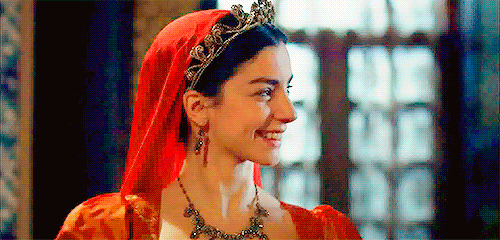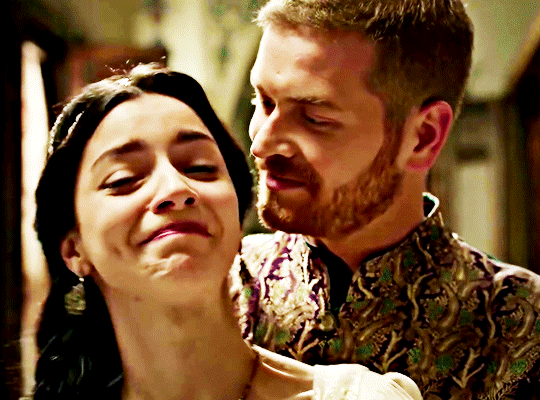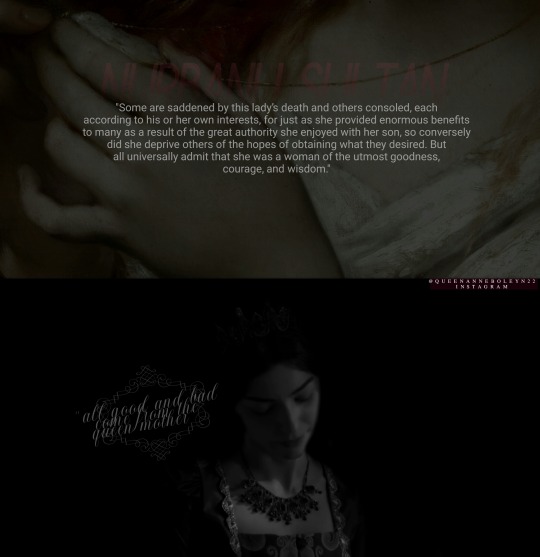#selim x nurbanu
Text
lol did anyone see the magnificent century most stable couple youtube poll from a few hours ago? nurbanu and selim having only 8% is a joke especially when the other couples on the list are ibrahim and hatice, suleiman and hürrem, and rustem and mihrimah.......
#granted they're still second place it's just that suleiman and hurrem took the overwhelming majority#and those two. they're a lot of things but STABLE is not one of them. guys please#tbf nurbanu and selim aren't 100% stable either but ffs compared to everyone else#at least they actually worked together. and nurbanu could speak her mind (most of the time) without him yelling at her#magnificent century#muhteşem yüzyıl#mc tag#i ramble#sultan suleyman#suleiman the magnificent#hürrem sultan#sehzade selim#selim#nurbanu sultan#selim x nurbanu#pargali ibrahim#ibrahim pasha#hatice sultan#mihrimah sultan#rustem pasha#rustem agha
21 notes
·
View notes
Text
Hold on I'm about to be SO insufferable about Nurbanu and Selim throughout this season 4 rewatch.
#sultan selim ii#nurbanu sultan#selim x nurbanu#nurlim#magnificent century#el sultán#muhteşem yüzyıl
14 notes
·
View notes
Photo





Selim & Nurbanu, Magnificent Century, 402
#muhtesem yüzyil#magnificent century#magnificentcenturyedit#selim x nurbanu#selim#nurbanu#perioddramaedit#engin ozturk#merve bolugur#perioddramasource#userperioddrama#periodedit#gifshistorical#cinematv#otpsource#filmtvcentral#smallscreenedit#popularculturesource#userthing#filmtv
106 notes
·
View notes
Text


muhteşem yüzyıl + favorite pair → şehzade selim x nurbanu sultan
#perioddramaedit#historyedit#magnificent century#muhtesem yuzyil#nurbanu sultan#sehzade selim#selim ii#*nurbanu#my otp#*selim#selim x nurbanu#engin öztürk#merve boluğur#merve bolugur#stiff: mine#mc: fp
109 notes
·
View notes
Text




MUHTEŞEM YÜZYIL: EPISODE 110 (2011-2014)
#mcedit#muhteşem yüzyıl#magnificent century#perioddramaedit#weloveperioddrama#perioddramasource#onlyperioddramas#they're so cute and soft here 🥺#i just love them#*mine#*nelim#nurbanu x selim#otp: we will rise to the stars#otp: nobody prays for me but you
50 notes
·
View notes
Text
Watching some of their scenes again along my skip through, I'm really a sucker for Nurbanu and Selim. I love when she gives him pep talks and puts things into perspective for him.
#Magnificent Century#Nurbanu Sultan#Nurbanu x Selim#I mean they still aren't the healthiest couple#but under these circumstances can you even have a healthy relationship?
11 notes
·
View notes
Text
People use the fact that Nigar always strokes Ibrahim’s ego in their scenes together and that Ibrahim says he found peace with Nigar as a “gotcha”, as an evidence that it wasn’t “love” for Ibrahim but only ego satisfaction. But open any Nurbanu/Selim scene and you will see similar dialogue lol.
#magnificent century#muhteşem yüzyıl#nigar kalfa#ibrahim pasha#ibrahim paşa#nigar x ibrahim#nurbanu sultan#şehzade selim
5 notes
·
View notes
Text
a glass of wine, a drop of disappointment

aegon targareyn x fem!original character
sinopsis: the dance of the dragons has began, and there is a little of tension between the new king and his wife.
a/n: i hope y’all like it, it’s my first fic in english and i’m a little afraid lol. i got the inspiration from a scene of magnificent century between Prince Selim and Nurbanu Sultan. also, i am not a fan of aegon but selim and aegon have alot of similarities.
ao3 link
It has been two years since Lady Joanne Lannister, youngest daughter of Tyland Lannister, married Prince Aegon Targaryen to strengthen the union of the houses. This marriage was about anything but love, well, at least at the beginning.
Those years of marriage helped to build an unexpected bound and relationship between the lady and the prince. They worked as a team, almost as if it was them against the entire realm.
A week has past since the beginning of the war for the throne, but time was playing a game with everyone and it was making it seems that a month has past.
Aegon was in front of the fireplace of his bedroom with a glass of wine in one hand and a paper in the other. He was so immersed in his thoughts that he almost didn’t hear the knock on the door.
“Come in” commaned while he threw the letter into the fire. Joanne walks throught the door accompanied by a royal guard, “Your Highness, Princess Joanne”.
He dismisses the guard and gave his full atention to his wife, without realizing the glass of wine was still in his hand.
“Why are you drinking again?” Her voice had a drop of disappointment in it. “How can you be so careless? I thought we talked about this. What would have happened if it was your mother who was entering your chambers and not me?” Now that drop became a river.
“Nothing bad it’s gonna happen to me, if you are always by my side” His word were kind but his tone was mocking her for how worried she was in that moment. "I didn't know it bothered you that much” She was ready to leave his room.
“Joanne, my love” he said, leaving his cup in a table near him and getting closer to her. “Everyone thinks my weakness is wine, that i have become its prisioner” His right hand grabs delicately her right cheek. “But thanks the gods they don’t know what my real weakness is, how helpless i am against you and how weak i can become without your presence”.
Her hands surrounded his waist while her eyes never stopped looking at his eyes. “If they ever know this, this war would end tomorrow”.
Before she could say how much love she feels for him, his lips have met hers. A moment their younger selves would have never thought it would happen.
#house of the dragon#aegon targaryen#aegon targaryen fanfic#aegon x reader#hotd fanfic#aegon ii x oc#aegon ii targaryen x oc#aegon ii targaryen
77 notes
·
View notes
Note
Send me a ship and I will grade it:
Selim x Nurbanu?
Where is the option overrated shshhs
Okay B: They're really cute
They're a good ship but I don't really care about them.. not much else to say
1 note
·
View note
Text
selim doesn't quite reach the category of "i stand with my cancelled wife" but he does reach the category of "my wife has been cancelled again and i get it and i'm also cancelling her rn but at this point i understand and accept that she's just like That and i'm going to be missing her sooner or later" and when most of the men of the series are varying degrees of horrible i truly do appreciate this fact about him
#sehzade selim#selim#nurbanu sultan#selim x nurbanu#muhteşem yüzyıl#muhtesem yuzyil#magnificent century#mc tag#i ramble
16 notes
·
View notes
Text
Love a Nurlim reunion and hug.
4 notes
·
View notes
Text

In 1599 Sunullatı Efendi, leader of the religious hierarchy of the Ottoman Empire and foremost guardian of the holy law of Islam, publicly lamented what he saw as a number of harmful and disruptive developments in Ottoman society. Among his several criticisms, he proclaimed that women should have nothing to do with “matters of government and sovereignty.”While other of his warnings were addressed to the general populace, this proclamation was aimed at the sultan and the dynastic family, whose senior women had come in recent decades to exercise an extraordinary degree of political influence. Sixteen years earlier, shortly before the death of Nurbanu, the mother of the sultan Murad III, the Venetian ambassador to the Ottoman court, Paolo Contarini, had commented that “all good and all bad come from the queen mother.” When Nurbanu died in December 1583, Contarini’s successor noted:
"Some are saddened by this lady’s death and others consoled, each according to his or her own interests, for just as she provided enormous benefits to many as a result of the great authority she enjoyed with her son, so conversely did she deprive others of the hopes of obtaining what they desired. But all universally admit that she was a woman of the utmost goodness, courage, and wisdom."
According to the Venetian ambassador Paulo Contarini the dismissal of the grand vezir Sinan Pasha in 1582 was due in large part to the efforts of the queen mother, Nurbanu Sultan, who wanted her own candidate in the post. In addition, observed Contarini, she was motivated by a desire “to avenge herself for the words that Sinan had dared to speak, that empires are not gov- erned with the counsel of women, and moreover that authority did not rest with her, even though she might try to make it seem so, but rather with the sultana consort.” It was perhaps at that moment, a year before the death of Nurbanu, that the combined power of the queen mother and the favorite was the greatest. The affair of Sinan Pasha’s dismissal reveals the rivalry not only between influential individuals in the inner and outer government but between female generations. The first haseki, Hurrem. pursued the greater part of her career free from the restraints imposed by a mother-in-law, and she died before she could act as queen mother, valide sultan, to her own daughter-in-law, Selim II's haseki, Nurbanu. Thus it was for the first time in the reign of Murad III, who as- cended the throne in 1574, that valide sultan and haseki competed for influ- ence over the sultan and over factions in government. The broad arena of power enjoyed by Hurrem could not easily be reoccupied by a concubine haseki in the presence of the valide sultan, the dynastic family’s eldest mem- ber. It is in this period that we observe the emergence of a hierarchy of female royal power, with the valide sultan at the top.
Nurbanu Sultan, the haseki of Selim II and the first of the great valide sultans, was born Cecelia Venier-Baffo, the illegitimate daughter of two Venetian noble families. Captured in 1537 by the Ottoman admiral Barbarossa Hayred- din Pasha when she was twelve, Nurbanu entered the imperial palace as a slave. She probably accompanied Selim as a member of his household when he left Istanbul in 1543 for his princely governorate in Konya, where she soon gave birth to the prince’s first child, a daughter. Selim seems to have confined his reproductive activity during the years of his princedom to this single concu- bine, although as sultan he fathered children by a number of concubines. Only one son, Murad, was born to Selim in the twenty-three years between his departure for his princely governorate and his accession in 1566, at the age of forty-two.
During Selim's princedom the Venetian ambassadors reported consistently that he was “lustful.” If Selim had more than one sexual partner as prince, however, measures must have been taken to ensure that only Nurbanu would bear children. The fact that she gave birth in rapid succession to four children— three daughters (Şah, Gevherhan, and İsmihan) followed by Murad in 1546— and then produced no other sons, suggests that Selim’s goal was to produce his heir by this particular concubine. Another daughter, Fatma, was born during Selim’s principate, probably around 1559; claims have been made that Nurbanu was her mother, although no conclusive evidence of this has come to light.
Following his father’s precedent, Selim appears to have taken his haseki as legal wife. According to the 1571 report of the ambassador Jacopo Ragazzoni, this marriage was related to the sultan’s esteem for his son Murad:
"Sultan Amurat [is] twenty-two, talented and well-educated, and very obser- vant of his religion, and therefore very much loved by all and by his father the Grand Signor, contrary to the custom of the Ottomans; six months ago his father the Signor, as a great token of his love, made a Chebin, which means that he took as legal wife [the prince’s] mother, a Circassian woman, and bestowed upon her a dowry of 110,000 ducats, wishing to outdo his father, who had bestowed a dowry of only 100,000 ducats on the mother of Selim. This wedding, like that of Süleyman and Hurrem, is not mentioned in Ottoman sources."
Source:
LESLIE P. PEIRCE: "THE IMPERIAL HAREM: -Women and Sovereignty in the Ottoman Empire" , New York, Oxford UNIVERSITY PRESS ,1993
#perioddramaedit#history#edit#history edit#nurbanuedit#nurbanu x selim#nurbanu sultan#nurbanu haseki sultan#merve boluğur#mervebolugur#muhtesem yuzil#muhteşem yüzyıl#myyedit#magnificent century#ottomanladiesedit#ottoman history#ottoman empire#imperial harem#leslie pierce#sultan selim#17th century#women in history#women of history#cecilia venier baffo#venetian#16th century#sultanate of women#murad iii#selim ii#haseki
94 notes
·
View notes
Photo








muhteşem yüzyıl + favorite pair → şehzade selim (selim ii) + afife nurbanu sultan
#perioddramaedit#historyedit#magnificent century#muhtesem yuzyil#nurbanu sultan#sehzade selim#selim ii#*nurbanu#my otp#selim x nurbanu#engin ozturk#merve bolugur#merve boluğur#stiff: mine#mc: fp#*selim
564 notes
·
View notes
Photo




#mcedit#kosemedit#muhteşem yüzyıl#magnificent century#perioddramaedit#this scene is so hot#your honor i love them#<333#*mc#*mine#*nelim#nurbanu x selim#otp: we will rise to the stars#otp: nobody prays for me but you
138 notes
·
View notes
Photo








#selimiye sultan#sehzade selim#magnificent century#muhteşem yüzyıl#Nurbanu Sultan#nurbanu x selemiye#nurbanu x selimiye#Sehzade Selim x Nurbanu Sultan#selimiye#hande doğandemir#merve bolugur#Engin Ozturk
79 notes
·
View notes
Note
How can you be so sure that only Haseki's are called Sultan, not any other Shehzades mother? Is their any supporting documents mentions it? Dont get offended please! Its just my curiosity! <3
"... the elite of the harem: those carrying the title "Sultan" (the valide sultan, the haseki sultan, and princes and princesses)" — Leslie P. Peirce, The Imperial Harem: Women and Sovereignty in the Ottoman Empire
If mothers of sons had carried the title Sultan, they would have been included in the "élite of the harem", as Peirce calls it... but they were not.
"Favorites were listed as "haseki sultan" or, in retirement, "haseki of the deceased Sultan X"—suggesting that the individual's fundamental relationship was with the sultan himself. Other concubine mothers of sons were listed as "the mother of Prince X" (valide-i Sultan X)—suggesting that the individual had no special relationship with the sultan, but only with a potential sultan, her son. Concubines who were the mothers of daughters only were not even listed individually in the privy purse registers, suggesting that they were perceived as enjoying no empowering relationship within the dynastic family." — The Imperial Harem
That mothers of princes of non-haseki status were not given the title Sultan is seen also in their stipends: Nurbanu received 1,000 aspers per day, the mothers of Selim II's other sons only 40. The difference is abysmal.
When there are multiple hasekis — in Murad IV's and Ibrahim's reigns — their stipends are always higher than the other concubines because they were different: they carried the Sultan title.
17 notes
·
View notes